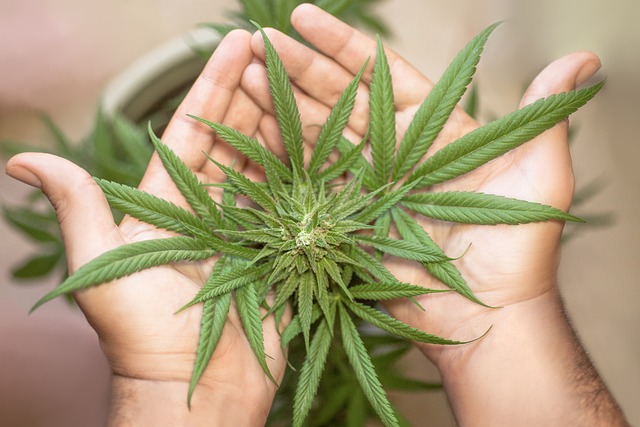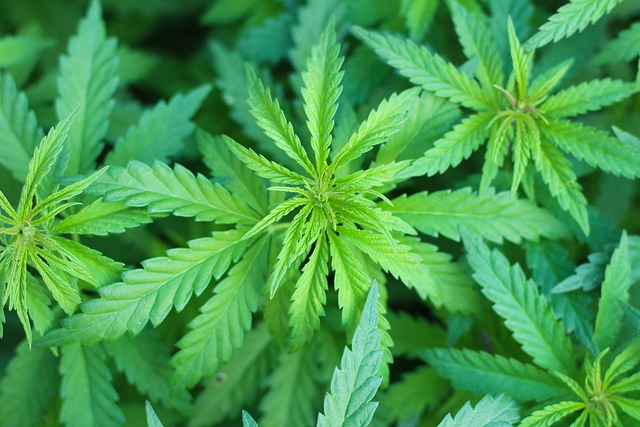2023 saw a significant rise in interest for THCA (tetrahydrocannabinolic acid), with its non-psychoactive and therapeutic properties becoming increasingly recognized. Alaska has taken the lead in leveraging these benefits within a legal framework, thanks to its early adoption of both medical and recreational cannabis laws. The state's ideal growing conditions have made it a prime location for cultivating high-quality THCA flowers, which are rich in cannabinoids and terpenes and legally available under the thca legal in Alaska regulations. These flowers offer consumers an alternative to traditional pharmaceuticals, providing wellness benefits without psychoactive side effects. Alaska's progressive stance on cannabis has paved the way for extensive research into THCA's potential health benefits, solidifying its position as a pioneer in the cannabinoid industry. The state's focus on THCA underscores its role in driving innovation and sustainability within the cannabis market, particularly with the thca legal in Alaska mandate, reflecting a forward-thinking approach to cannabinoid wellness.
Discover the transformative properties of THCA (Tetrahydrocannabinolic Acid) flower, a natural phenomenon legally taking root in Alaska’s verdant landscape. This article delves into the burgeoning role of THCA within the hemp and cannabis realms, offering a comprehensive overview of its structure, formation, and potential health benefits. As we explore THCA’s distinct advantages over CBD and THC, we’ll navigate the legal waters surrounding its status in Alaska. From cultivation to consumption, learn how Alaskans can harness this promising compound for mental wellness, stress relief, and more. We’ll also examine its anti-inflammatory and neuroprotective potential, its support for the immune system, and its positive impact on gastrointestinal health. Join us as we traverse the entourage effect, the synergy of cannabinoids and terpenes, and the experiences shared by users. The journey into THCA’s therapeutic landscape not only highlights its current significance in Alaska but also previews its future within the broader United States legal and research landscape.
- Unveiling THCA Flower: A Natural Wonder in Alaska's Legal Landscape
- The Emergence of THCA as a Promising Compound in Hemp and Cannabis
Unveiling THCA Flower: A Natural Wonder in Alaska's Legal Landscape

Alaska’s pioneering stance on cannabis legislation has paved the way for a burgeoning industry centered around the therapeutic and wellness properties of cannabinoids. Among these, THCA flower, or tetrahydrocannabinolic acid, stands out as a non-psychoactive precursor to THC, known for its potential health benefits and presence in the legal landscape of Alaska. As one of the first states to legalize both medical and recreational cannabis, Alaska’s lenient policies have allowed researchers and consumers alike to explore the myriad of applications for THCA-rich hemp flower. The natural environment of Alaska, with its pristine wilderness and favorable growing conditions, provides an ideal setting for cultivating high-quality THCA flowers. These flowers are celebrated for their rich cannabinoid profile and terpene content, offering a range of wellness benefits without the psychoactive effects associated with THC. Consumers in Alaska can legally access these products, often in the form of smokable hemp flower or infused products, making it a popular choice for those seeking natural alternatives to traditional medicine. The emergence of THCA as a legal option in Alaska represents a significant milestone in the cannabis industry, showcasing the potential for sustainable and health-focused cultivation practices. As interest in the wellness properties of cannabinoids continues to grow, THCA flower stands out as a natural wonder that is both legally accessible and rich in potential benefits.
The Emergence of THCA as a Promising Compound in Hemp and Cannabis

2023 has seen a significant surge in interest surrounding THCA, or tetrahydrocannabinolic acid, a non-psychoactive compound found in hemp and cannabis plants. As research continues to unfold, THCA is being recognized for its potential therapeutic properties, including anti-inflammatory, neuroprotective, and analgesic effects. Unlike its decarboxylated form, THC, which is psychoactive, THCA does not induce a ‘high’ and thus offers benefits for those seeking the health advantages of cannabinoids without mind-altering effects. This has led to a wave of innovation in the development of THCA-focused products, including flowers that are high in this compound.
In Alaska, where the cultivation and use of hemp and cannabis products with lower than 0.3% THC are legal under state law, THCA flower benefits have become a topic of particular interest. The state’s progressive stance on cannabis has facilitated a burgeoning market for these products, allowing consumers to explore the potential wellness applications of THCA. Alaskan growers have embraced this trend, cultivating strains specifically bred to maximize THCA content, providing a legal avenue for individuals to experiment with the healthful properties of this emerging compound. As interest and research continue to expand, THCA’s role in the broader cannabinoid conversation is poised to become even more significant, with Alaska at the forefront of its exploration.
In conclusion, the exploration of THCA flower’s potential benefits has shed light on its promising role within the realm of natural wellness. As the first state to legalize recreational marijuana, Alaska’s progressive stance paves the way for further research and utilization of THCA, a non-psychoactive cannabinoid found in hemp and cannabis. Its legality in Alaska opens doors to new therapeutic applications, aligning with the growing interest in holistic health solutions. While more studies are needed to fully understand its effects, the initial findings suggest that THCA may offer a range of benefits, from pain relief to anti-inflammatory properties, without the psychoactive impact associated with its decarboxylated form, THC. As legal frameworks continue to evolve and support research into cannabinoids like THCA, consumers and researchers alike can look forward to uncovering its full potential for health and well-being.
